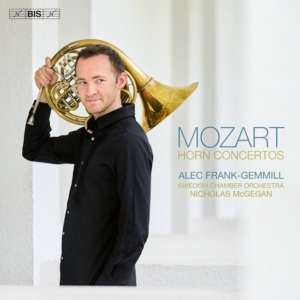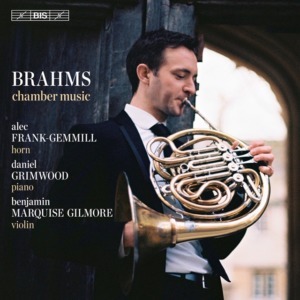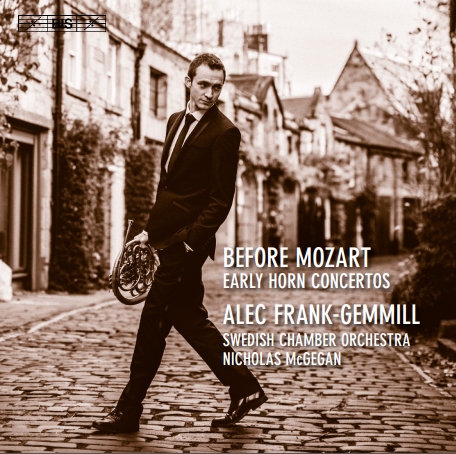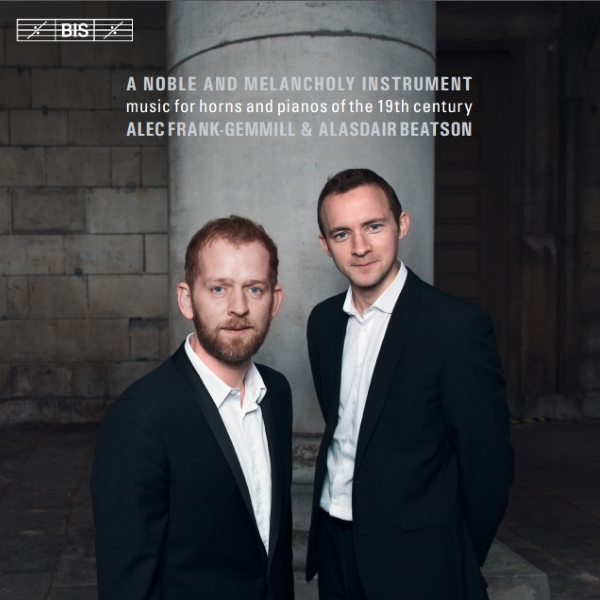Alec Frank-Gemmill - Press Reviews
 Album: Mozart Horn Concertos
Album: Mozart Horn Concertos
How wonderful it is to revisit these tuneful, often jolly concertos played by a superb horn virtuoso, Alec Frank-Gemmill, backed by the Swedish Chamber Orchestra conducted by one of the world’s most distinguished period-practice authorities, Nicholas McGegan. Frank-Gemmill’s mastery is complete, extending to his improvised cadenzas and lead-ins. The sound of his modern Alexander 90 Single B-flat horn is superbly captured by Thore Brinkmann of Take5 Music Production, who perfectly blends the horn’s distinctive, distant mellowness with the resonance of its gold-brass body.
Recording of the Month – Jason Victor Serinus, Stereophile, March 2025
His virtuosity is remarkable, not only in terms of surmounting the technical challenges that Mozart threw at his favourite horn player, Joseph Leutgeb, but also for the expressive and dynamic range of his playing. Piquant touches of ornamentation and Frank-Gemmil’s own cadenzas and lead-ins never fail to raise a smile. Name a virtuoso horn player of the recording era and they’re bound to have set down the Mozart concertos. With faultless accompaniment from the Swedish CO under Nicholas McGegan, this exhilarating recording ensures that Alec Frank-Gemmill’s name is now prominent among them.
David Threasher, Gramophone, January 2025
… [Alec Frank-Gemmill’s] top-drawer playing consistently impresses, with its distinctive, open-throated timbre in slow movements, and fluency and seeming effortless delivery of perilous passagework elsewhere. The finale of K495… highlights the clarity of articulation of his playing throughout this album, while the winsome Romanza preceding it readily brings Dennis Brain’s peerless musicianship to mind…
Michael Jameson, BBC Music Magazine, Christmas issue 2024
… what a lovely legato, the smooth sound of horn player Alec Frank-Gemmill, beautifully matched by the strings of the Swedish Chamber Orchestra conducted by Nicholas McGegan… they deliver the joyful spirit of the last movement of all four Mozart concertos with effortless elegance.
Andrew McGregor, BBC Radio 3 Record Review, 16 November 2024
This SACD promises hours of fun, as Mozart’s Horn Concertos are among the most enjoyable music he wrote. British soloist Alec Frank-Gemmill not only plays them with great elan but gives us an extra Concerto; and he is neatly and stylishly accompanied by the Swedish CO. Nicholas McGegan is usually associated with period orchestras but I am glad he conducts modern instruments here, as the slight added warmth really suits Mozart. Usually we get just the famous four Concertos, K412 in D and K417, 447 and 495 in E flat, all with delightful 6/8 Rondos including the ‘Flanders and Swann’ one. But Stephen Roberts has reconstructed the Allegro, K370b, and Rondo, K371, as well as helping Frank-Gemmill adapt a violin concerto slow movement for K412.
Tully Potter, Daily Mail, 9 November 2024
The three E flat concertos receive bold, characterful readings, and one hopes that Mozart would have giggled at Frank-Gemmill’s cheekier additions – try K447’s first movement cadenza, taking in multiphonics and a stratospheric high B flat, or a nicely raucous conclusion to K495. The hunting finales are all superb here, each one a mixture of grit and polish. And do sample K417’s brief Andante, showcasing this soloist’s ability to make the horn sing. Nicholas McGegan’s Swedish Chamber Orchestra provide sympathetic support and BIS’s sound has depth and detail.
Graham Rickson, The Arts Desk, 9 November 2024

Album: Brahms Chamber Music
There are so many fine recordings of Brahms’s Horn Trio, several of which I have in my library, that choice can be difficult. There is no doubt in my mind that this new one with Frank-Gemmill, Grimwood, and Gilmore is up there with the best. Indeed, it is now my version of choice for various reasons. Not least of all is the natural horn Frank-Gemmill employs with its lighter, mellower tone, but his technical skill is also transfixing. The beauty of Frank-Gemmill’s tone is retained and the high run to the conclusion [of the Horn Trio] is exhilarating. This is the kind of rendition that makes one want to return to it immediately and hear it again. A magnificent performance!
Leslie Wright, Music Web International, November 2021
Fascinating to hear new colours in a familiar work, with Brahms’s First Cello Sonata transcribed for French horn. It also makes a fine prelude to a terrific performance of the Horn Trio. ****
Jeremy Pound, BBC Music Magazine, February 2021
…the sombre first theme [of Cello Sonata No 1, Op 38] translates into the horn’s autumnal tones like a dream … and Frank-Gemmill’s intelligent shaping and articulation all contribute to its success.
Charlotte Gardner, Gramophone, December 2020
This work [Horn Trio] is frequently played on the natural (unvalved) horn; using a vintage instrument with piston valves allows Frank-Gemmill’s quieter playing to really sing. This is a gloriously soulful performance with the Adagio mesto packing a huge emotional charge. The close is so desolate you wonder how Brahms will pick himself up. He does, of course, with another galumphing 6/8 rondo, Frank-Gemmill’s agility all the more impressive for being played on a vintage peashooter.
Graham Rickson, The Arts Desk, 14 November 2020
…a well balanced trio…with Frank-Gemmil’s lyrical phrasing and warm tone
Andrew MacGregor, BBC Radio 3 Record Review, 10 October 2020
 Album: Before Mozart: Early Horn Concertos
Album: Before Mozart: Early Horn Concertos
…the technical challenges are formidable, and he [Frank-Gemmill] meets them with an assurance that often takes your breath away. Neruda’s vertiginous lines ascend into the stratospheres with astonishing ease and Haydn’s rapid-fire figurations are done with effortless dexterity. Nothing is vacuously showy, however: virtuosity is consistently placed at the service of expression… An exceptional disc that confirms and consolidates his reputation as one of today’s finest horn payers, it makes for compelling and essential listening.
Tim Ashley, Gramophone, June 2018
This is an outstanding collection, in which Frank-Gemmill’s stratospheric virtuosity, on three different instruments, is elegantly counterpointed by Nicholas McGegan’s buoyantly sympathetic direction… A radiantly engineered recital of heart-warming bonhomie and virtuoso sparkle.
Julian Haylock, BBC Music Magazine, June 2018
Five horn concertos from the five decades before Mozart make a fun programme for a brilliant player… In the Haydn, Frank-Gemmill plays across an amazing range. Superb recordings increase our pleasure.
Tully Potter, Daily Mail, 26 May 2018
Alec Frank-Gemmill is just fantastic at writing his booklet notes as well as playing the horn… [Neruda Horn Concerto in E flat Major] is just technically so accomplished but so musical as well. You feel the horn can do anything – and he does… absolutely a joy to listen to, this CD, from start to finish. Things like the ornamentation just sound so effortless… I really think it’s a wonderful CD.
Sarah Devonald, BBC Radio 3 Record Review, 19 May 2018
Frank-Gemmill’s agility is second to no horn player active today. A superb disc.
Colin Clarke, Classical Music Magazine, May 2018
What had me salivating was a chance to hear the concerto by one Johann Baptist Georg Neruda, a piece usually appropriated by greedy trumpet players. Frank-Gemmill conclusively proves that this is a genuine horn work. It’s ludicrously, impossibly high, originally written for a Dresden virtuoso who specialised in the horn’s clarino register. Telemann’s D Major Concerto is less daunting, though Leopold Mozart’s Sinfonia da Camera contains some scary moments. More musically satisfying is Haydn’s Concerto No. 1, composed for the same player who inspired Leopold Mozart’s son. Haydn’s finale is a joyous romp, a mirthsome sequence of trills and rapid arpeggios which would be more popular if it wasn’t so hard to play. A superb collection.
Graham Rickson, The Arts Desk, April 2018
 Album: A Noble and Melancholy Instrument
Album: A Noble and Melancholy Instrument
Nominated for a 2018 BBC Music Magazine Award
There was a time when a recital featuring a number of different period horns and pianos would have almost certainly been an uphill struggle for both players and listeners. So to encounter a programme featuring some of the core works in the horn repertoire played on historically appropriate instruments with such effortless musicianship and technical ease really takes some believing… Frank-Gemmill and Beatson enter the fray with fearless alacrity, making even the most well-worn of phrases sound freshly minted.
Julian Haylock, BBC Music Magazine, July 2017
The changes of sound and technology are fascinating, but the programme and the playing are what really make this such an excellent recital – and the recording’s pretty good as well.
Andrew McGregor, BBC Radio 3 Record Review, 6 May 2017
Both notable performers on modern instruments, Alec Frank-Gemmill and Alasdair Beatson here revel in the sonic possibilities offered by the historic instruments with results that are as delighting as they are enlightening.
Presto Classical
All of which [the historical premise for the recording] is academically fascinating, but would be irrelevant if the playing of both musicians was not of such high calibre, virtuosic and technically flawless, but with real emotional depth. And such is the variety here, there is bound to be at least one piece that steals your melancholy heart.
Keith Bruce, The Herald, 31 March 2017
The logistical and organisational challenges must have been immense, but the musical results are glorious… Fiendish enough on a modern instrument [Schumann’s Adagio and Allegro], Frank-Gemmill’s fearless, colourful playing on an antique single horn paradoxically makes the piece sound easier. … As a bonus, the pair throw in a typically anachronistic piece of English fluff: Gilbert Vintner’s Hunter’s Moon was a favourite of Dennis Brain. Written as late as 1942, it’s an inconsequential delight, the sizzling handstopped notes a highlight. Unmissable, with Beatson an unfailingly sympathetic accompanist.
Graham Rickson, The Arts Desk, 15 April 2017
